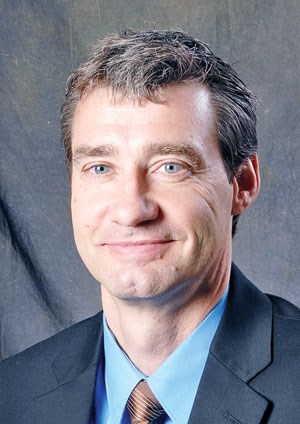A "whim" and an interest in biological science led Greg Douglas into the profession as veterinarian, and an interest in public policy further led him to his current position, as head veterinarian for Saskatchewan.
A "whim" and an interest in biological science led Greg Douglas into the profession as veterinarian, and an interest in public policy further led him to his current position, as head veterinarian for Saskatchewan.
Growing up on the family farm at McTaggart, the son of Ed and Elaine Douglas, he graduated in 1981 from the Weyburn Comp, and attributes the group of teachers in the science department for developing his interest in science, especially in biology.
"I was always interested in the sciences, thanks to the teachers; one was Darold Kot, he was a guy I looked up to. I thought the whole science wing was a great group of teachers at the Comp," said Douglas.
When he headed off to the university, his initial interest was in marine
"To be frank, I wasn't willing to leave Saskatchewan just yet, so on a whim, I got into the College of Veterinary Medicine," he said, noting he graduated from that college in 1991.
"I really enjoyed the course. It's a well-balanced look at all the species, as well as surgery," said Douglas. As a veterinary student, he spent some time working with Dr. Gary Hoium at the Weyburn vet clinic, and through him he was able to work with small animals as well as larger livestock like horses and cattle.
He noted while he grew up on a farm, there were no farm animals to speak of as it was mostly a grain operation.
"It wasn't until I worked with Dr. Hoium that I got to work with larger animals. Gary is a great mentor, a great teacher, and was a fine business owner. We're still good friends today," said Douglas.
After graduating, he worked for two practices located immediately north of Edmonton, in the Morinville area, and they had every size of animal come through, large and small, plus a wildlife park near the town of Bon Accord, which exposed him to a lot of different species.
At this time, his wife also worked for the Alberta government; after a few years, he and his wife had the opportunity to work in Hawaii for a year. Greg worked in a high-end clinic that did expensive surgeries just outside of Honolulu.
"I was doing different types of surgery on small animals. My wife and I quite enjoyed our year there. We wanted to come back to Canada, so we took positions in Regina; my wife has been with the provincial government ever since, and I came back to private practice. I farmed with my father and brother Trevor while I had a private locum business to Regina practices," said Douglas.
His step up into higher responsibilities began when the Canadian Food Inspection Agency (CFIA) offered him a position in 2001, and over the years he worked on the BSE file in relation to cattle producers, Chronic Wasting Disease or CWD, which affected a significant part of Saskatchewan's deer and elk population, and the avian influenza outbreak in the Fraser Valley in B.C.
Then, in March of 2009, the province offered Greg the position as the chief veterinary officer for Sask. Agriculture, which he holds to the present day.
"Most of my role is communications. In government as a whole, there isn't a lot of frame of reference in relation to veterinary science, so my role is to give orders and formulate policy, and establish programs to lessen the impact of diseases we have in Saskatchewan," he explained of his position.
An example is when a serious disease like anthrax outbreaks, or Foot-in-Mouth disease, comes up, he needs to formulate policies to reduce the risk and to also work with other agencies, such as the CFIA. Also, he provides information to ministers and those in government departments that may be affected by a given disease outbreak or concern.
He also works with bio-security in relation to the federal government, particularly when any serious outbreaks occur.
"We have a role to play to help producers in all sectors to implement programs that will help them keep cataclysmic diseases from invading the farm," said Douglas. "My role for the most part is to give advice to those in more senior roles in government."
This advice is called upon when something of a major nature appears, and ministers and others in key roles need to know its implications, and how serious it really is, and what the province is doing in cooperation with other provinces, agencies or the federal government.
To highlight how important his position is, Douglas noted, "In this day and age, what we've seen in the last 25 years, about 75 per cent of the new infectious diseases have come from animals. It's going to become more apparent both veterinary and human fields will need to work more collaboratively together."
As far as farming, Greg admits he hasn't been able to do much of it in recent years, and leaves that to his brother Trevor, who runs the farm at McTaggart.
"I'd like to get down more; I really enjoy it. I find agriculture is satisfying, and I really miss it," said Greg.
